1304 - Jane Johnson to Mrs Garth, 3 June 1742
- Transcription
- Letter Details
- People (1)
- How to Cite
Image 1 of 7
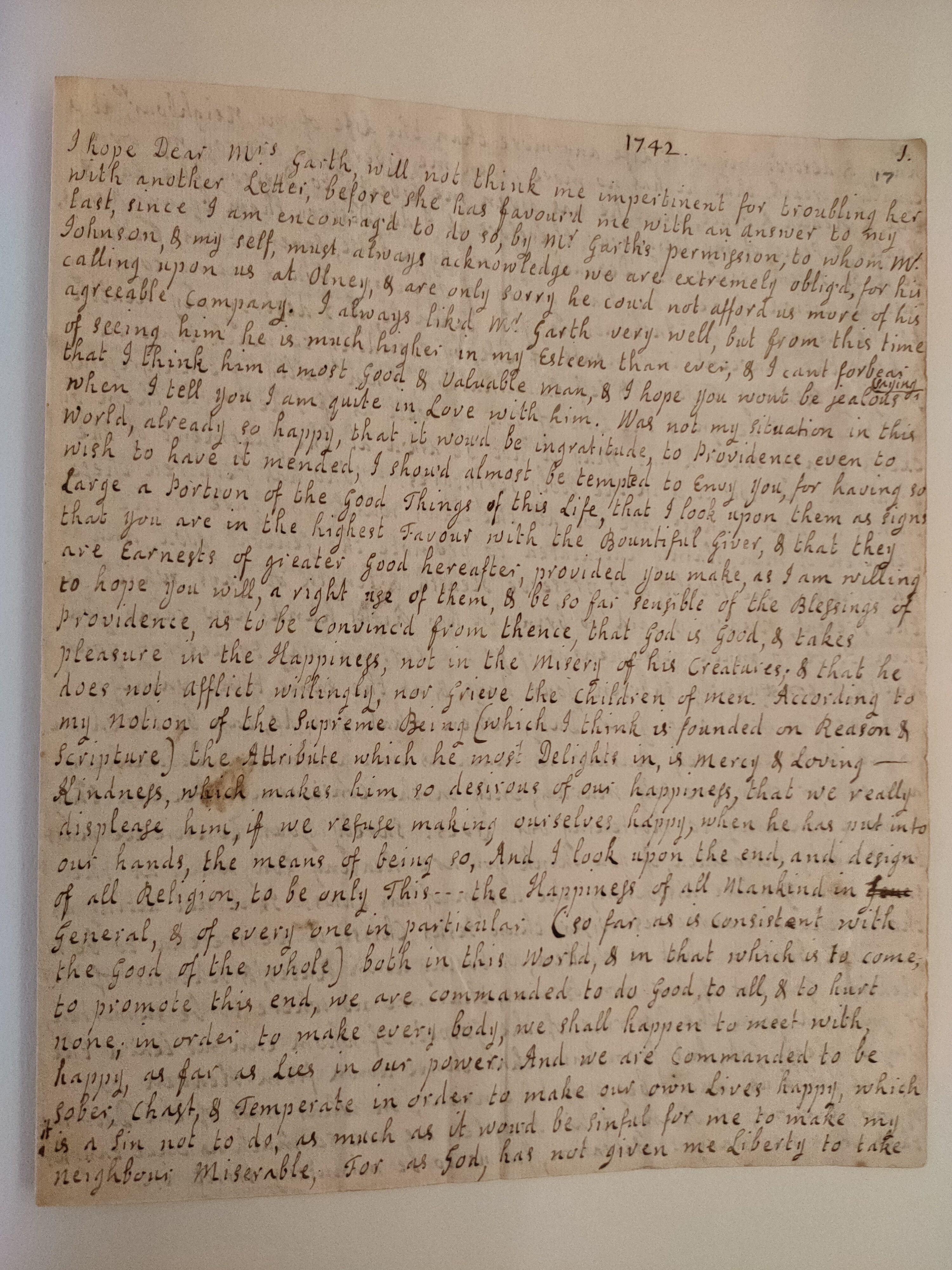
Image 2 of 7
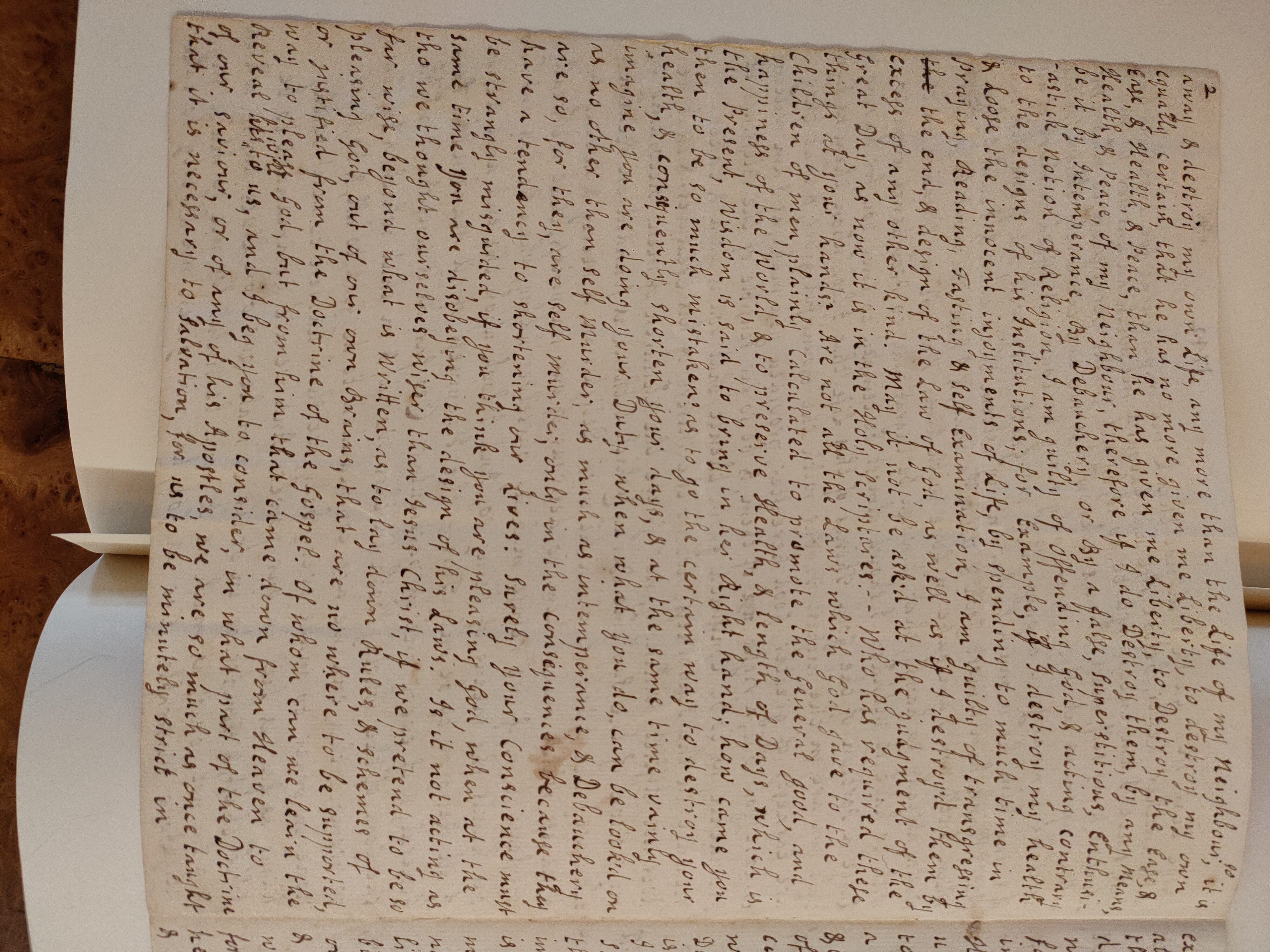
Image 3 of 7
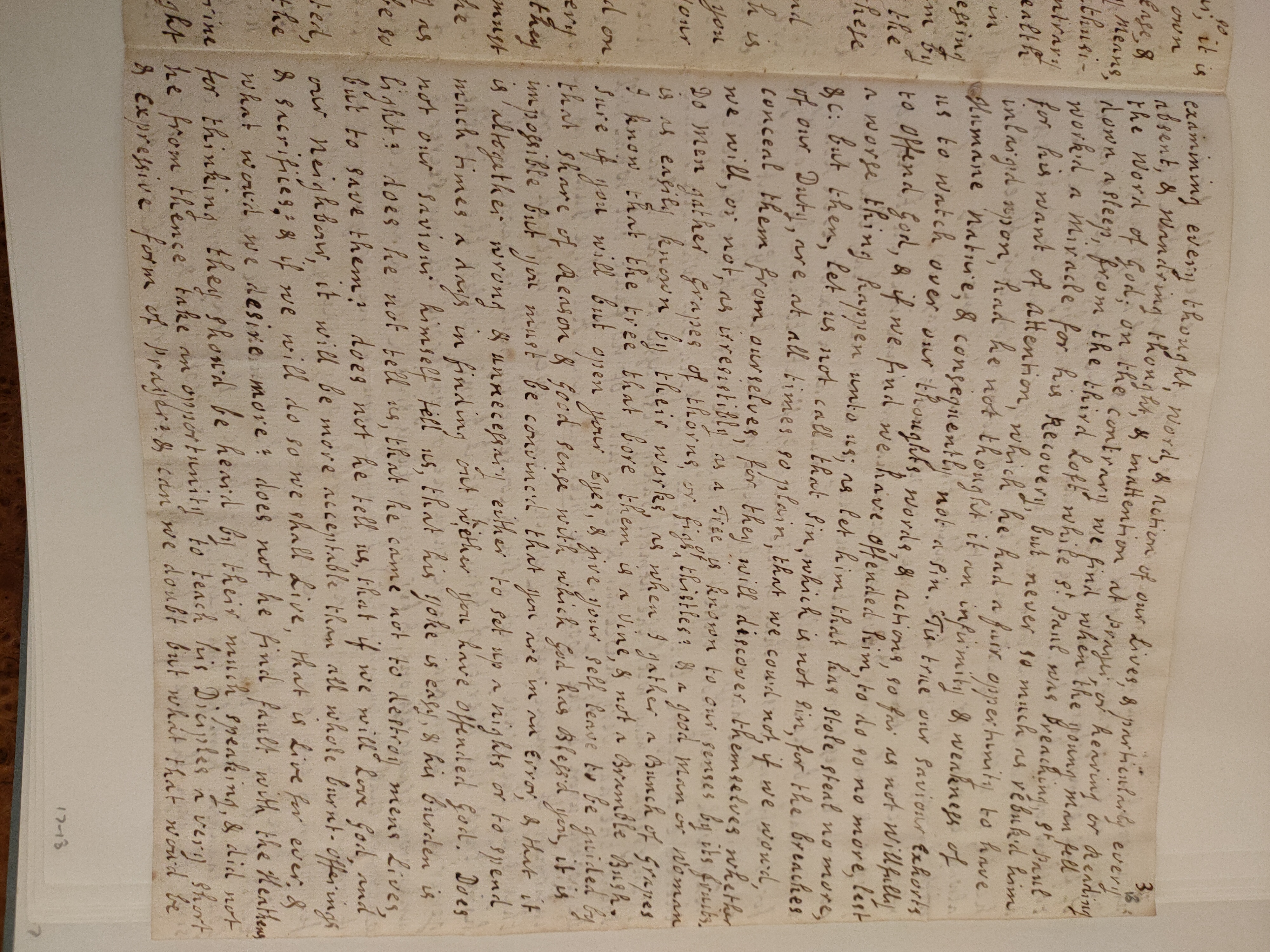
Image 4 of 7
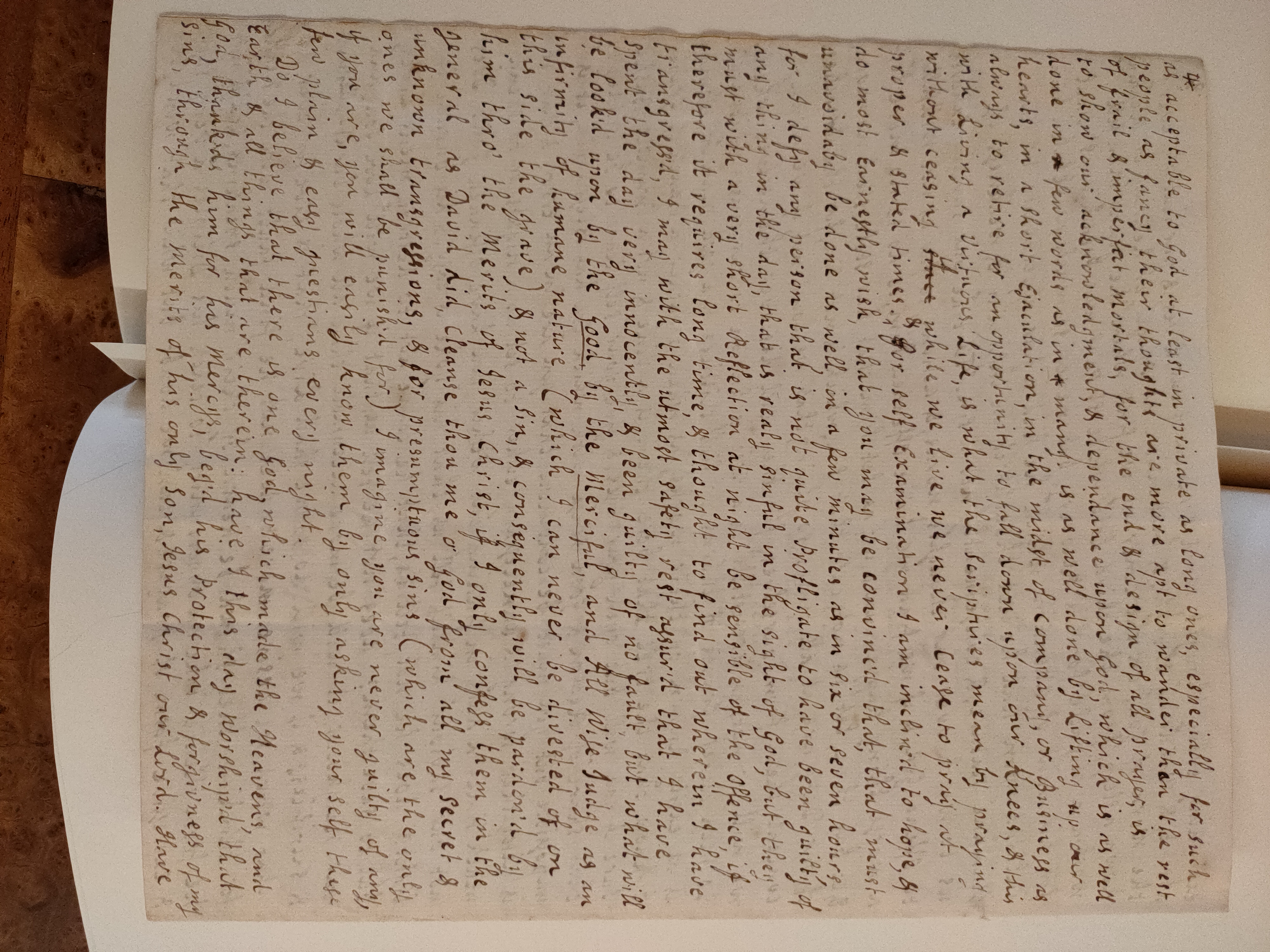
Image 5 of 7
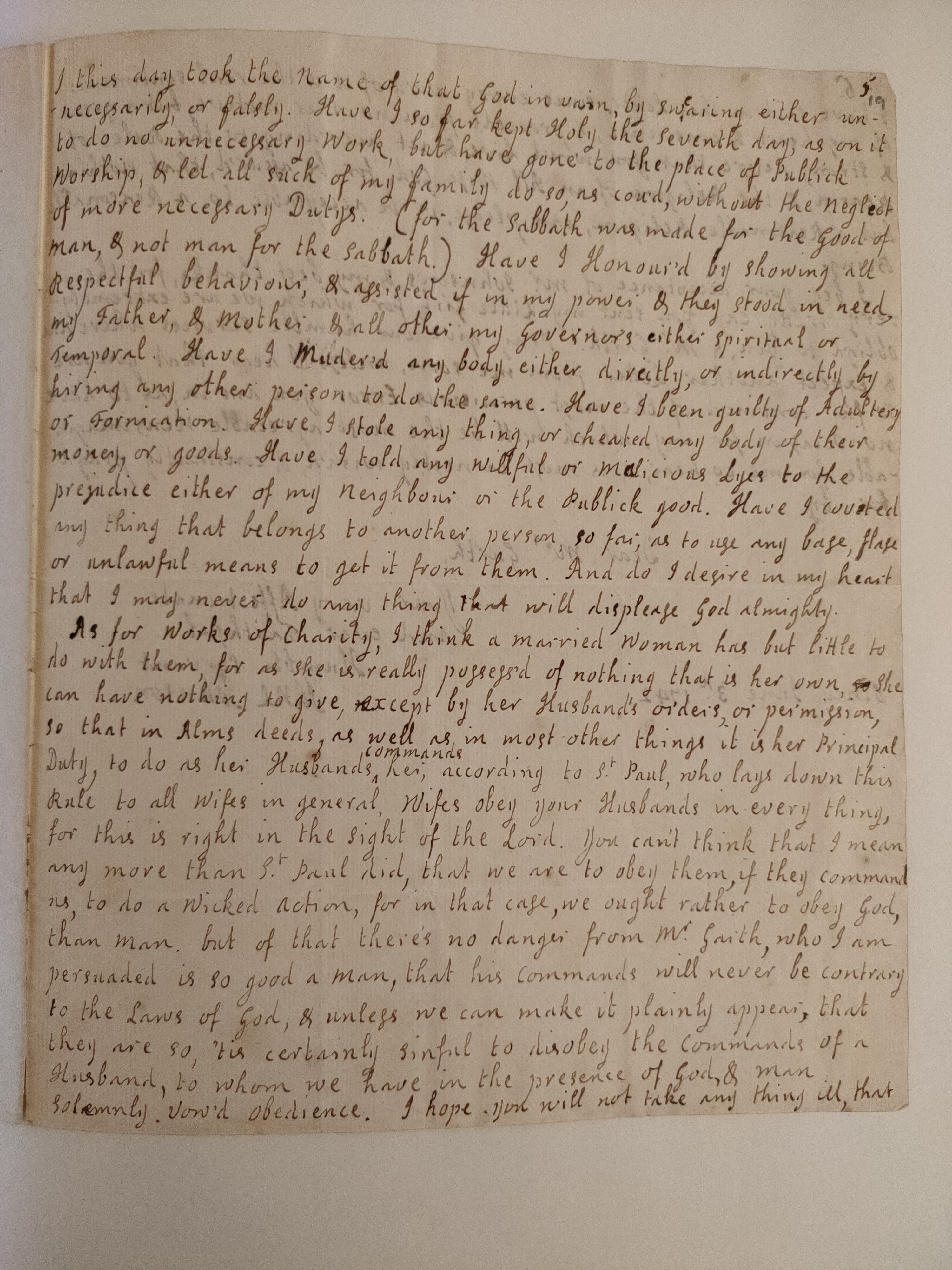
Image 6 of 7
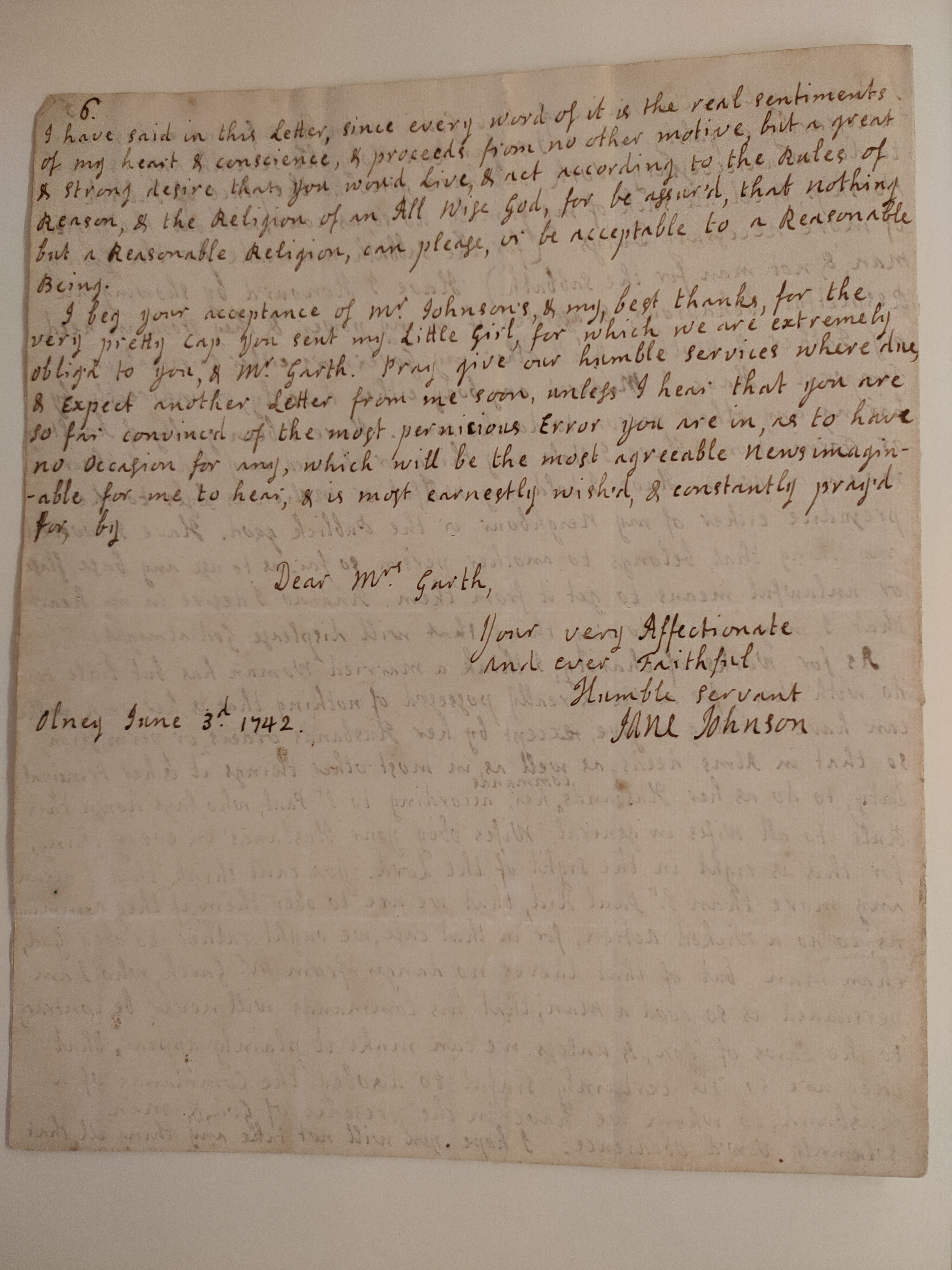
Image 7 of 7
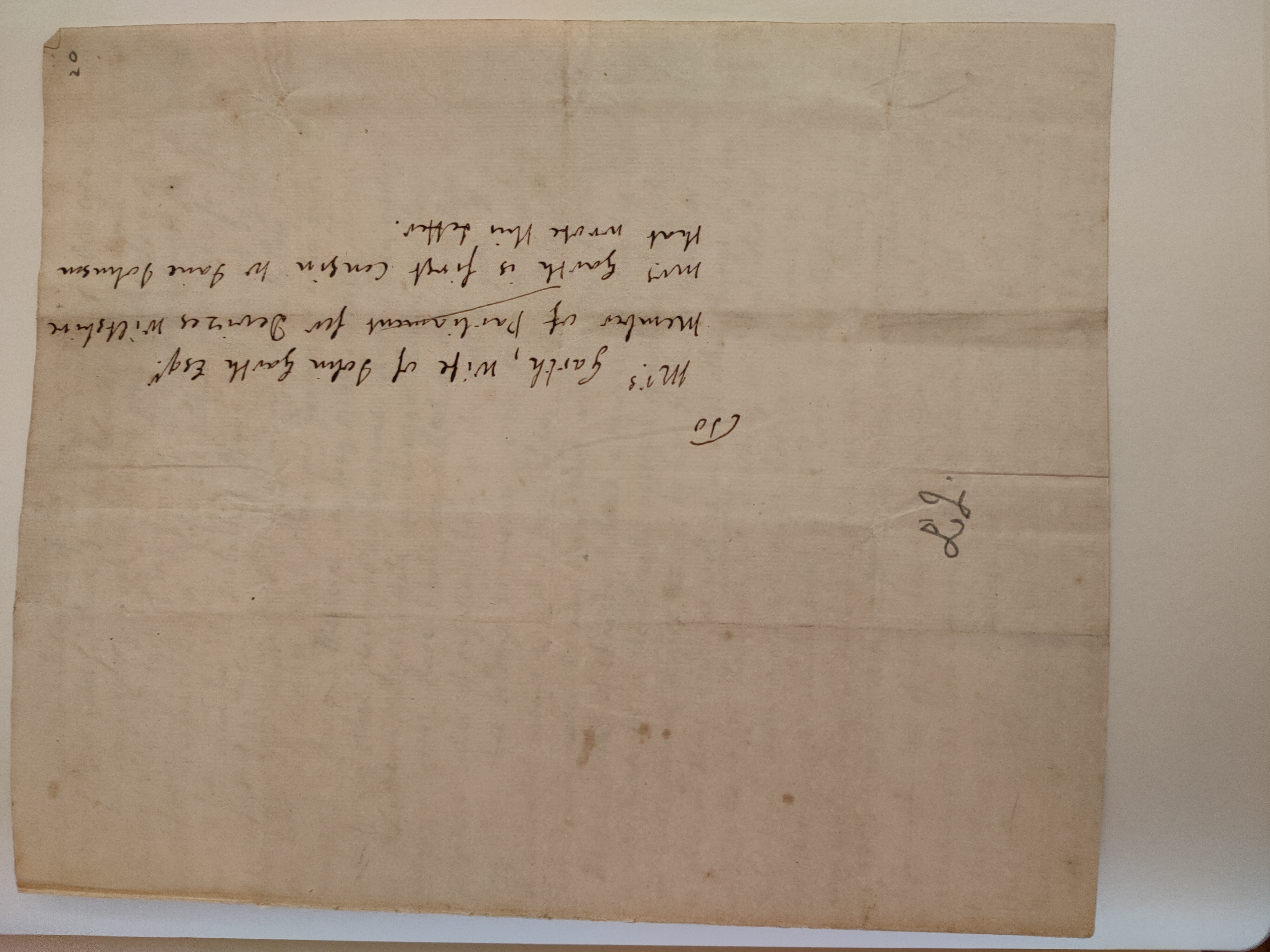
with another Letter, before she has favour’d me with an answer to my
last, since I am encourag’d to do so, by Mr Garth’s permission, to whom Mr
Johnson, & my self, must always acknowledge we are extremely oblig’d for his
calling upon us at Olney, & are only sorry he could not afford us more of his
agreeable company. I always lik’d Mr Garth very well, but from this time
of seeing him he is much higher in my esteem than ever, & I cant forbear
that I think him a most Good & Valuable man, & I hope you wont be jealous {^saying}
when I tell you I am quite in Love with him. Was not my situation in this
world, already so happy, that it woud be ingratitude, to Providence even to
wish to have it mended, I shou’d almost be tempted to Envy you, for having so
Large a portion of the Good Things of this Life, that I look upon them as signs
that you are in the highest Favour with the Bountiful Giver, & that they
are Earnests of greater Good hereafter, provided you make, as I am willing
to hope you will, a right use of them, & be so far sensible of the Blessings of
providence as to be Convinc’d from thence, that God is Good, & takes
pleasure in the Happiness, not in the misery of his Creatures; & that he
does not afflict willingly, nor Grieve the Children of men. According to
my notion of the Supreme Being (which I think is founded on Reason &
Scripture) the Attribute which he most Delights in, is mercy & Loving –
kindness, which makes him so desirous of our happiness, that we really
displease him, if we refuse making ourselves happy, when he has put into
our hands, the means of being so, And I look upon the end, and design
of all Religion, to be only This… the Happiness of all Mankind in
General, & of every one in particular (so far as is consistent with
the Good of the whole) both in this World, & in that which is to come,
to promote this end, we are commanded to do Good, to all, & to hurt
none, in order to make every body, we shall happen to meet with
happy, as far as Lies in our power: And we are commanded to be
sober, Chast, & Temperate in order to make our own Lives happy, which
is a sin not to do, as much as it woud be sinful for me to make my
neighbour miserable, For as God, has not given me Liberty to take
[f.17v]
away & destroy my own Life, any more than the Life of my Neighbour; {^so} it is
equally certain, that he has no more given me Liberty, to destroy my own
Ease, & Health, & Peace, than he has given me Liberty, to Destroy the Ease, &
Health, & Peace, of my Neighbour, therefore if I do Destroy them, but any Means,
be it by Intemperance, By Debauchery, or By a false, Superstitious, Enthusi-
astick notion of Religion, I am guilty of Offeding God, & acting contrary
to the designs of his Institutions; for Example, if I destroy my health
& Loose the innocent injoyments of Life, by spending to much time in
Praying, Reading, Fasting & Self Examination, I am guilty of transgressing
excess of any other kind. May it not be asked at the judgment of the
Great Day, as now it is in the Holy Scriptures – Who has required these
things at your hands? Are not all the Laws which God gave to the
Children of men, plainly calculated to promote the General good, and
happiness of the World, & to preserve Health, & length of Days, which is
the Present, Wisdom is said to bring in her Right hand; how came you
then to be so much mistaken? as to go the certain way to destroy your
health, & consequently shorten your days, & at the same time vainly
imagine you are doing your Duty, when what you do, can be looked on
as no other than self murder, as much as intemperance, & Debauchery
are so, for they are self murder; only in the consequences because they
have a tendency to shortening our Lives. Surely your conscience must
be strangly misguided, if you think you are pleasing God, when at the
same time you are disobeying the design of his Laws. Is it not acting as
tho we thought ourselves wiser than Jesus Christ, if we pretend to be so
far wise, beyond what is written, as to lay down Rules, & schemes of
pleasing God, out of our own Brains, that are no where to be supported
or justified from the Doctrine of the Gospel. Of whom can we learn the
way to pleas God, but from him that came down from Heaven to
Reveal his its {^will}to us, and I beg you to consider, in what part of the Doctrine
of our Saviour, or of any of his Apostles, we are so much as once taught
that it is necessary to Salvation, for us to be minutely strict in
[f.18]
examining every thought, word, & action of our Lives, & particularly every
absent, & wandering thought, & inattention at Prayer, or hearing or Reading
the Word of God; on the contrary we find when the young man fell
down asleep, from the third Loft while St Paul was preaching, St Paul
work’d a Miracle for his Recovery, but never so much as rebuk’d him
for his want of attention, which we had a fair opportunity to have
inlarg’d upon, had he not thought it an infirmity & weakness of
Humane nature, & consequently not a sin. ‘Tis true out saviour Exhorts
us to watch over our thoughts words, & actions, so far as not Willfully,
to offend God, & if we find we have offended him, to do so no more, lest
a worse thing happen unto us; as let him that has stole steal no more,
&c: but then, let us not call that sin, which is not sin, for the breaches
of our Duty, are at all times so plain, that we cou’d not, if we wou’d
conceal them from ourselves, for they will discover themselves whether
we will, or not, as irresistibly as a Tree is known to our senses by its fruits
Do men gather grapes of thorns, or figs {^of thistles?} & a good man or Woman
is as easily known by their works, as when I gather a Bunch of Grapes
I know that the tree that bore them is a Vine, & not a Bramble Bush.
Sure if you will but open your Eyes, & give your self leave to be guided by
that share of Reason & Good sense with which God has Bless’d you, it is
impossible but you must be convinc’d that you are in an Error, & that it
is altogether wrong & unnecessary either to set up a nights or to spend
much times a days in finding out w{^h}ether you have offended God. Does
not our saviour himself tell us, that his yoke is easy, & his burden is
light? Does he not tell us, that he came not to destroy mens Lives,
but t save them? does not he tell us, that if we will Love God, and
our neighbour, it will be more acceptable than all whole burnt-offerings
& sacrifices? & if we will do so we shall Live, that is Live for ever, &
what woud we desire more? does not he find fault with the Heathens
for thinking they shou’d be heard by their much speaking, & did not
he from thence take an opportunity to teach his Disciples a very short
& Expressive form of prayers & can we doubt but what that wou’d be
[f.18v]
as acceptable to God at least in private as long ones, especially for such
people as fancy their thoughts are more apt to wander then the rest
of frail & imperfect mortals, for the end & design of all prayer, is
to show our acknowledgment, & dependance upon God, which is as well
done in
hearts, in a short Ejaculation, in the midst of company, or Business as
always to retire for an opportunity to fall down upon our knees, & this
with living a Virtuous Life, is what the scriptures mean by praying
without ceasing
proper & stated times {^& for self Examination I am inclined to hope, &
do most Earnestly wish, that you may be convinc’d that, that must
unavoidably be done as well, in a few minutes as in six or seven hours,
for I defy any person that is not quite Profligate to have been guilty of
any thing in the day, that is realy sinful in the sight of God, but they
must with a very short Reflection at night be sensible of the Offence, if
therefore it requires long time, & thought to find out wherein I have
transgressed, I may with the utmost safety rest assur’d that I have
spent the day very innocently, & been guilty of no fault, but what will
be look’d upon be the Good by the Merciful, and All Wise Judge as an
infirmity of humane nature (which I can never be diverted of on
this side of the grave) & not a sin, & consequently will be pardon’d by
him thro’ the merits of Jesus Christ, if I only confess them in the
general as David did cleanse thou me o God from all me secret &
unknown transgressions, & for presumptuous sins (which are the only
ones we shall be punish’d for) I imagine you are never guilty of any
if you are, you will easily know them by only asking your self these
few plain & easy questions every night
Do I believe that there is one God, which made the Heavens, and
Earth & all things that are therin: have I this day Worship’d that
God, thank’d him for his mercys, beg’d his Protection & forgivness of my
sins, through the merits of his only son, Jesus Christ our Lord. Have
[f.19]
I this day took the name of that God in vain, by sufaring either in-
necessarily, or falsely. Have I so far kept Holy the seventh day, as on it
to do no unnecessary Work, but have gone to the place of Publick
Worship, & let all such of my family do so, as cou’d, without the neglect
of more necessary Dutys. (For the Sabbath was made for the Good of
man, & not man for the Sabbath.) Have I Honour’d by showing all
Respectfull behaviour, & assisted if in my power & they stood in need,
my Father, & Mother & all other my Governors either spiritual or
Temporal. Have I Murder’d any body either directly, or indirectly by
hiring any other person to do the same. Have I been guilty of Adultery
or Fornication. Have I stole any thing, or cheated any body of their
money, or goods. Have I told any willful or malicious Lyes to the
prejudice either oh my neighbour or the Publick good. Have I coveted
any thing that belongs to another person, so far, as to use any base, false
or unlawful means to get it from them. And do I desire in my heart
that I may never do any thing that will displease God almighty.
As for Works of Charity, I think a married woman has but little to
do with them, for as she is really possess’d of nothing that is her own,
can have nothing to give, except by her Husband’s orders, or permission,
so that in Alms deeds, as well as in most other things it is her Principal
Duty, to do as her Husbands {^Commands} her, according to St Paul, who lays down this
Rule to all Wifes in general, Wifes obey your Husbands in every thing,
for this is right in the sight of the Lord. You can’t think that I mean
any more than St Paul did, that we are to obey them, if they command
us, to do a wicked action, for in that case, we ought rather to obey God,
than man. but of that there’s no danger from Mr Garth, who I am
persuaded is so good a man, that his commands will never be contrary
to the Laws of God, & unless we can make it plainly appear, that
they are so, ‘tis certainly sinful to disobey the commands of a
Husband, to whom we have in the presence of God, & man
solemnly. Vow’d Obedience. I hope you will not take any thing ill, that
[f.19v]
I have said in this Letter, since every word of it is the real sentiments
of my heart & conscience, & proceeds from no other motive, but a great
& strong desire that you wou’d Live, & act according to the Rules of
Reason, & the Religion of an All Wise God, for be assur’d, that nothing
but a Reasonable Religion, can please, or be acceptable to a Reasonable
Being.
I Beg your acceptance of Mr Johnson’s, & my, best thanks, for the
very pretty cap you sent my Little Girl, for which we are extremely
oblig’d to you, & Mr Garth. Pray give our humble services where due,
& Expect another Letter from me soon, unless I hear that you are
so far convinced of the most pernicious Error you are in, as to have
no occasion for any, which will be the most agreeable news imagin-
-able for me to hear, & is most earnestly wish’d, & constantly pray’d
for by
Dear Mrs Garth,
your very Affectionate
and ever Faithful
Humble Servant
Jane Johnson
Olney June 3d. 1742
[f.20]
To
Mrs Garth, Wife of John Garth Esqr
Member of Parliament for Devizes Wiltshire
Mrs Garth is first Cousin to Jane Johnson
that wrote this letter
with another Letter, before she has favoured me with an answer to my
last, since I am encouraged to do so, by Mr Garth’s permission, to whom Mr
Johnson, & my self, must always acknowledge we are extremely obliged for his
calling upon us at Olney, & are only sorry he could not afford us more of his
agreeable company. I always liked Mr Garth very well, but from this time
of seeing him he is much higher in my esteem than ever, & I cant forbear
that I think him a most Good & Valuable man, & I hope you wont be jealous {^saying}
when I tell you I am quite in Love with him. Was not my situation in this
world, already so happy, that it would be ingratitude, to Providence even to
wish to have it mended, I should almost be tempted to Envy you, for having so
Large a portion of the Good Things of this Life, that I look upon them as signs
that you are in the highest Favour with the Bountiful Giver, & that they
are Earnests of greater Good hereafter, provided you make, as I am willing
to hope you will, a right use of them, & be so far sensible of the Blessings of
providence as to be Convinced from thence, that God is Good, & takes
pleasure in the Happiness, not in the misery of his Creatures; & that he
does not afflict willingly, nor Grieve the Children of men. According to
my notion of the Supreme Being (which I think is founded on Reason &
Scripture) the Attribute which he most Delights in, is mercy & Loving –
kindness, which makes him so desirous of our happiness, that we really
displease him, if we refuse making ourselves happy, when he has put into
our hands, the means of being so, And I look upon the end, and design
of all Religion, to be only This… the Happiness of all Mankind in
General, & of every one in particular (so far as is consistent with
the Good of the whole) both in this World, & in that which is to come,
to promote this end, we are commanded to do Good, to all, & to hurt
none, in order to make every body, we shall happen to meet with
happy, as far as Lies in our power: And we are commanded to be
sober, Chaste, & Temperate in order to make our own Lives happy, which
is a sin not to do, as much as it would be sinful for me to make my
neighbour miserable, For as God, has not given me Liberty to take
[f.17v]
away & destroy my own Life, any more than the Life of my Neighbour; {^so} it is
equally certain, that he has no more given me Liberty, to destroy my own
Ease, & Health, & Peace, than he has given me Liberty, to Destroy the Ease, &
Health, & Peace, of my Neighbour, therefore if I do Destroy them, but any Means,
be it by Intemperance, By Debauchery, or By a false, Superstitious, Enthusi-
astick notion of Religion, I am guilty of Offending God, & acting contrary
to the designs of his Institutions; for Example, if I destroy my health
& Loose the innocent enjoyments of Life, by spending to much time in
Praying, Reading, Fasting & Self Examination, I am guilty of transgressing
excess of any other kind. May it not be asked at the judgment of the
Great Day, as now it is in the Holy Scriptures – Who has required these
things at your hands? Are not all the Laws which God gave to the
Children of men, plainly calculated to promote the General good, and
happiness of the World, & to preserve Health, & length of Days, which is
the Present, Wisdom is said to bring in her Right hand; how came you
then to be so much mistaken? as to go the certain way to destroy your
health, & consequently shorten your days, & at the same time vainly
imagine you are doing your Duty, when what you do, can be looked on
as no other than self murder, as much as intemperance, & Debauchery
are so, for they are self murder; only in the consequences because they
have a tendency to shortening our Lives. Surely your conscience must
be strangely misguided, if you think you are pleasing God, when at the
same time you are disobeying the design of his Laws. Is it not acting as
though we thought ourselves wiser than Jesus Christ, if we pretend to be so
far wise, beyond what is written, as to lay down Rules, & schemes of
pleasing God, out of our own Brains, that are no where to be supported
or justified from the Doctrine of the Gospel. Of whom can we learn the
way to pleas God, but from him that came down from Heaven to
Reveal his its {^will}to us, and I beg you to consider, in what part of the Doctrine
of our Saviour, or of any of his Apostles, we are so much as once taught
that it is necessary to Salvation, for us to be minutely strict in
[f.18]
examining every thought, word, & action of our Lives, & particularly every
absent, & wandering thought, & inattention at Prayer, or hearing or Reading
the Word of God; on the contrary we find when the young man fell
down asleep, from the third Loft while St Paul was preaching, St Paul
worked a Miracle for his Recovery, but never so much as rebuked him
for his want of attention, which we had a fair opportunity to have
enlarged upon, had he not thought it an infirmity & weakness of
Humane nature, & consequently not a sin. ‘Tis true out saviour Exhorts
us to watch over our thoughts words, & actions, so far as not Wilfully,
to offend God, & if we find we have offended him, to do so no more, lest
a worse thing happen unto us; as let him that has stole steal no more,
&c: but then, let us not call that sin, which is not sin, for the breaches
of our Duty, are at all times so plain, that we could not, if we would
conceal them from ourselves, for they will discover themselves whether
we will, or not, as irresistibly as a Tree is known to our senses by its fruits
Do men gather grapes of thorns, or figs {^of thistles?} & a good man or Woman
is as easily known by their works, as when I gather a Bunch of Grapes
I know that the tree that bore them is a Vine, & not a Bramble Bush.
Sure if you will but open your Eyes, & give your self leave to be guided by
that share of Reason & Good sense with which God has Blessed you, it is
impossible but you must be convinced that you are in an Error, & that it
is altogether wrong & unnecessary either to set up a nights or to spend
much times a days in finding out w{^h}ether you have offended God. Does
not our saviour himself tell us, that his yoke is easy, & his burden is
light? Does he not tell us, that he came not to destroy men's Lives,
but t save them? does not he tell us, that if we will Love God, and
our neighbour, it will be more acceptable than all whole burnt-offerings
& sacrifices? & if we will do so we shall Live, that is Live for ever, &
what would we desire more? does not he find fault with the Heathens
for thinking they should be heard by their much speaking, & did not
he from thence take an opportunity to teach his Disciples a very short
& Expressive form of prayers & can we doubt but what that would be
[f.18v]
as acceptable to God at least in private as long ones, especially for such
people as fancy their thoughts are more apt to wander then the rest
of frail & imperfect mortals, for the end & design of all prayer, is
to show our acknowledgment, & dependence upon God, which is as well
done in
hearts, in a short Ejaculation, in the midst of company, or Business as
always to retire for an opportunity to fall down upon our knees, & this
with living a Virtuous Life, is what the scriptures mean by praying
without ceasing
proper & stated times {^& for self Examination I am inclined to hope, &
do most Earnestly wish, that you may be convinced that, that must
unavoidably be done as well, in a few minutes as in six or seven hours,
for I defy any person that is not quite Profligate to have been guilty of
any thing in the day, that is really sinful in the sight of God, but they
must with a very short Reflection at night be sensible of the Offence, if
therefore it requires long time, & thought to find out wherein I have
transgressed, I may with the utmost safety rest assured that I have
spent the day very innocently, & been guilty of no fault, but what will
be looked upon be the Good by the Merciful, and All Wise Judge as an
infirmity of humane nature (which I can never be diverted of on
this side of the grave) & not a sin, & consequently will be pardoned by
him thro’ the merits of Jesus Christ, if I only confess them in the
general as David did cleanse thou me o God from all me secret &
unknown transgressions, & for presumptuous sins (which are the only
ones we shall be punished for) I imagine you are never guilty of any
if you are, you will easily know them by only asking your self these
few plain & easy questions every night
Do I believe that there is one God, which made the Heavens, and
Earth & all things that are therein: have I this day Worshipped that
God, thanked him for his mercies, begged his Protection & forgiveness of my
sins, through the merits of his only son, Jesus Christ our Lord. Have
[f.19]
I this day took the name of that God in vain, by suffering either in-
necessarily, or falsely. Have I so far kept Holy the seventh day, as on it
to do no unnecessary Work, but have gone to the place of Public
Worship, & let all such of my family do so, as could, without the neglect
of more necessary Duties. (For the Sabbath was made for the Good of
man, & not man for the Sabbath.) Have I Honoured by showing all
Respectful behaviour, & assisted if in my power & they stood in need,
my Father, & Mother & all other my Governors either spiritual or
Temporal. Have I Murdered any body either directly, or indirectly by
hiring any other person to do the same. Have I been guilty of Adultery
or Fornication. Have I stole any thing, or cheated any body of their
money, or goods. Have I told any wilful or malicious Lies to the
prejudice either oh my neighbour or the Public good. Have I coveted
any thing that belongs to another person, so far, as to use any base, false
or unlawful means to get it from them. And do I desire in my heart
that I may never do any thing that will displease God almighty.
As for Works of Charity, I think a married woman has but little to
do with them, for as she is really possessed of nothing that is her own,
can have nothing to give, except by her Husband’s orders, or permission,
so that in Alms deeds, as well as in most other things it is her Principal
Duty, to do as her Husbands {^Commands} her, according to St Paul, who lays down this
Rule to all Wifes in general, Wifes obey your Husbands in every thing,
for this is right in the sight of the Lord. You can’t think that I mean
any more than St Paul did, that we are to obey them, if they command
us, to do a wicked action, for in that case, we ought rather to obey God,
than man. but of that there’s no danger from Mr Garth, who I am
persuaded is so good a man, that his commands will never be contrary
to the Laws of God, & unless we can make it plainly appear, that
they are so, ‘tis certainly sinful to disobey the commands of a
Husband, to whom we have in the presence of God, & man
solemnly. Vowed Obedience. I hope you will not take any thing ill, that
[f.19v]
I have said in this Letter, since every word of it is the real sentiments
of my heart & conscience, & proceeds from no other motive, but a great
& strong desire that you would Live, & act according to the Rules of
Reason, & the Religion of an All Wise God, for be assured, that nothing
but a Reasonable Religion, can please, or be acceptable to a Reasonable
Being.
I Beg your acceptance of Mr Johnson’s, & my, best thanks, for the
very pretty cap you sent my Little Girl, for which we are extremely
obliged to you, & Mr Garth. Pray give our humble services where due,
& Expect another Letter from me soon, unless I hear that you are
so far convinced of the most pernicious Error you are in, as to have
no occasion for any, which will be the most agreeable news imagin-
-able for me to hear, & is most earnestly wished, & constantly prayed
for by
Dear Mrs Garth,
your very Affectionate
and ever Faithful
Humble Servant
Jane Johnson
Olney June 3d. 1742
[f.20]
To
Mrs Garth, Wife of John Garth Esqr
Member of Parliament for Devizes Wiltshire
Mrs Garth is first Cousin to Jane Johnson
that wrote this letter
Jane Johnson to Mrs Garth, 3 June 1742
A detailed and very religious letter in which Johnson gives her cousin detailed advice about living a good Christian life. They enjoyed seeing Mr Garth when he visited – they like him very much, and were she not already happily married, Johnson might envy her cousin’s marital situation. Johnson warns against damaging health by spending too much time in prayer and fasting – that is as much a transgression of God’s will as other examples of excess in life. The damage to health that occurs from overzealous religious practice goes against God’s designs. God’s rules are designed to strengthen health and promote longevity – Garth’s excessive piety does the opposite, and Johnson likens it to suicide. Much of the advice urges Garth to stick to the basics, to follow the ten commandments, to pray moderately, to act according to God’s word, to ‘open her eyes’ and to avoid making up her own rules. She hopes that Garth will not be offended by the advice she offers in this letter – they are the true sentiments of her heart. She concludes by thanking Garth for a pretty cap she has sent her daughter.
Johnson Family
MS. Don. c. 190 f.17
Bodleian Libraries, University of Oxford
1742
6
3
Olney, Buckinghamshire [England]
[England]
primary author
heart
- devotional practice
- writing
longevity
health
- feeling
- grateful
- happy
- hopeful
- resentment
- worried
- disposition
- duty
- faith
- self
regimen
- at home
- religious meeting
god
To Cite this Letter
Jane Johnson to Mrs Garth, 3 June 1742, 361742: Bodleian Libraries, University of Oxford, Johnson Family, MS. Don. c. 190 f.17
To Cite this Edition
Material Identities, Social Bodies: Embodiment in British Letters c.1680-1820. Compiled by: Karen Harvey, Helen Esfandiary, Sarah Fox, Emily Vine, University of Birmingham. Project funded by the Leverhulme Trust (2021-2025, Ref. RPG-2020-163), https://socialbodies.bham.ac.uk.